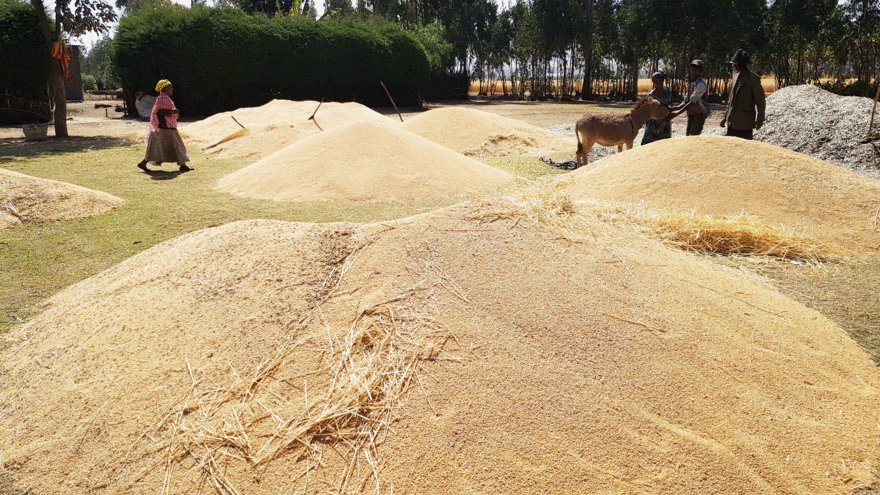Tackling widespread seed insecurity among smallholder farmers is a multilevel technical and institutional challenge, according to new doctoral research by NMBU’s Teshome Hunduma Mulesa.
Researchers and practitioners are urgently calling for policy and financial support to increase farmers' access to diverse seeds that can better adapt crops to climate- and socioeconomic changes and increase food security. Paradoxically, barriers at multiple levels – local, national and international – seem to hinder rather than enable such access.
Local and international barriers to seed access
At the international level, restrictive regulations have limited access to plant genetic resources for growing food. The shared benefits of easy access to seeds have been reduced. These barriers have developed over the last four decades, despite evidence showing international interdependence and mutual benefits from sharing genetic resources.
At the national and local levels, farmers’ access to seeds (or more broadly, seed security) is negatively affected by several factors, including the loss of crop diversity and a lack of government support for farmers’ seed systems.
In this research, Mulesa documents shared concerns among the international development community and Western representatives to the UN's Food and Agriculture Organization that Ethiopia is unwilling to share its genetic resources.
This is despite Ethiopia having a global image of being a biodiversity treasure trove. Ethiopia is, for example, widely seen as being the center of origin and diversity for several food crops and is celebrated for its use of genetic resources that originated elsewhere in its agriculture, such as maize from Mexico.
State monopoly on agriculture
Mulesa emphasises how, in Ethiopia, the state has a monopoly on agricultural inputs, including the production and supply of certified seeds of improved varieties. He reports a lack of government support for the private-sector and farmer-based seed supply systems that are necessary for seed security.
This research shows that since the 1990s, Ethiopia has adopted very restrictive national laws, exercising strict national control over its genetic resources. Whilst this has made access easier for users within the country, it has restricted international users outside Ethiopia, for example, multinational companies who aim to develop new varieties in Ethiopia’s genetic resource base, and this can have negative consequences for seed security.
Historically, the reasons for these restrictions were social, economic, and political. For example, the patenting of Ethiopia’s cultural keystone species, teff, by a Dutch company was a fear shared among policymakers and technocrats of losing control over the country’s genetic resources. This shared concern created mistrust of open access to genetic resources for international users, leading to restrictive policies and laws. Today, Ethiopians are guarded about their indigenous crops, e.g., teff and coffee, because of their economic importance to agriculture.
"Ethiopians are very aware of the global value of their indigenous crops (e.g., coffee) and want to gain more from their international commercialization", explains Mulesa.
In a historical analysis of access governance of plant genetic resources in Ethiopia, Mulesa and his doctoral supervisor concluded that Ethiopia’s current restrictive policy and practices should be understood in connection with, and not in isolation from, international intellectual property rights such as patent regimes. The authors encourage an understanding of Ethiopia’s historical, economic, political, and cultural importance for future engagement with the country’s government on these issues.
Widespread seed insecurity among commercial and smallholder farmers in Ethiopia
To assess the current situation of farmers’ seed security in rural Ethiopia, Mulesa interviewed 432 smallholder farmers and 26 policy and technical experts, and analysed government policies. He found that, although government policy on seed system development is solid in identifying farmers’ seed security problems, implementation lags. Seed system bottlenecks mean that seed insecurity remains a problem for smallholder farmers.
Seed insecurity was widespread, both among commercial wheat farmers and smallholder teff farmers, in the two districts investigated in the central highlands of Ethiopia. Mulesa and colleagues documented the details of these seed insecurity problems in an article in the Journal of Agronomy.
Mulesa’s doctoral research concludes that farmers’ seed insecurity will not be abated unless the Ethiopian government abolishes the state monopoly on agricultural input, including seeds. As the only uncolonized country in Africa, Ethiopia is perhaps proud to continue to make its own policies and regulations, independent of external influence. However, the dominance of weak public seed system institutions and governmental control on agricultural inputs have marginalized other actors that could complement national efforts. According to these findings, government programs and investments to support the appropriate available alternatives could increase farmers’ seed security (in seed varieties preferred by farmers) and provide enough quality seed, with easy access to it.
Mulesa’s doctoral research findings also provides insight into why Ethiopia restricts access for users outside its borders. This research is thus highly relevant for the ongoing international negotiations on multilateral access and benefit-sharing within the framework of FAO’s Plant Treaty.
"Since the 1990s, several donors, including the World Bank, have offered their development assistance to improve farmers’ seed security in Ethiopia. They wanted to support both farmer-based and private sector seed production and supply based on crops and the agro-ecological diversity of the country. The Ethiopian state maintains a monopoly on agricultural input, leaving the good work only to donors. It is time to build on good initiatives and programs and put money where the mouth is,” says Mulesa.
__________________
Teshome Hunduma Mulesa will defend his thesis 'Sowing seeds of security: A multilevel perspective on the governance of plant genetic resources and seed systems in Ethiopia' on Friday 8 April 2022 in the Festsalen of NMBU's Clock Building.

